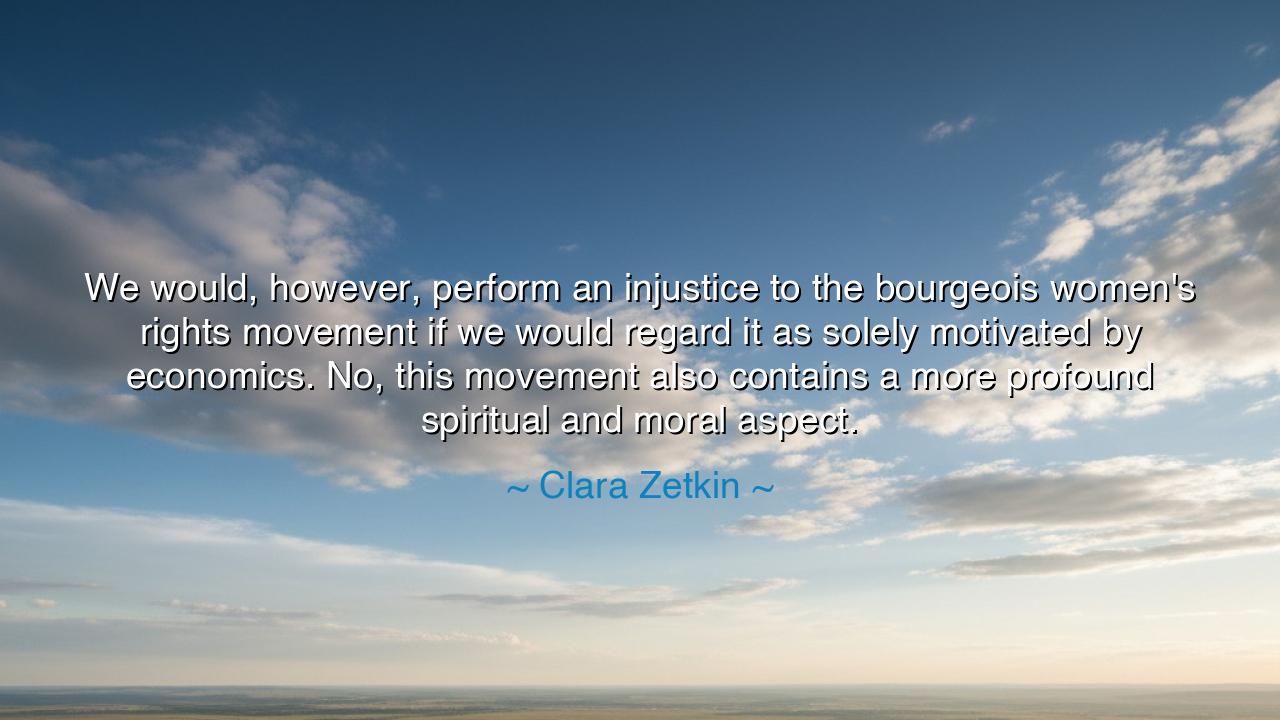
We would, however, perform an injustice to the bourgeois women's
We would, however, perform an injustice to the bourgeois women's rights movement if we would regard it as solely motivated by economics. No, this movement also contains a more profound spiritual and moral aspect.






Hear, O children of justice and seekers of balance, the words of Clara Zetkin, the lioness of socialism and champion of women: “We would, however, perform an injustice to the bourgeois women's rights movement if we would regard it as solely motivated by economics. No, this movement also contains a more profound spiritual and moral aspect.” In this utterance, she acknowledges that the cry for women’s rights is not born only from material need, but also from the deepest longings of the soul.
For the bourgeois women’s rights movement, though rooted in the struggles of middle-class women, was not merely about wages or property. It carried within it the spiritual desire for dignity, for recognition as human beings equal in worth to men, and the moral demand that no sex should be condemned to silence. To reduce such a movement to economics alone would be to blind oneself to its greater flame—the yearning for freedom in heart and spirit.
Zetkin, as a Marxist, often sought to frame women’s oppression in terms of class and labor. Yet in this rare acknowledgment, she opened her eyes to a broader truth: that rights are never only about bread and survival, but also about respect, self-expression, and humanity’s shared destiny. Even within the so-called “bourgeois” struggle, there lived a cry that touched the universal—freedom of mind, freedom of body, freedom of soul.
History gives us witness. Consider Mary Wollstonecraft, who in the 18th century wrote A Vindication of the Rights of Woman. She argued not only for education and economic opportunity but also for the moral truth that women were rational beings, endowed with reason and deserving of equal respect. Hers was not simply an economic plea, but a spiritual and moral revolution, challenging the very foundation of patriarchy.
Therefore, let this wisdom endure: every movement for liberation contains layers—material, social, spiritual. To honor women’s struggles, one must see beyond wages and laws, to the cry of the soul for dignity and justice. Clara Zetkin’s words remind us that true equality is not only measured in wealth or rights, but also in the recognition of women’s full humanity. For where spirit and morality join with economics, there lies a revolution both profound and unstoppable.






PANguyen Le Phuc An
Zetkin's quote is a reminder that the women’s rights movement is multifaceted, shaped not only by material concerns but by moral and spiritual aspirations. In the current political climate, are we losing sight of the moral and spiritual components of women’s rights in favor of more economic and legal battles? How can we bring more of that moral dimension into the modern feminist movement to ensure a more holistic approach?
PDHa viet phu duc
Clara Zetkin's perspective adds depth to the understanding of the women’s rights movement by suggesting that it isn’t only an economic pursuit but also rooted in moral and spiritual aspirations. Does this distinction help us appreciate the diversity of motivations behind feminist movements, even today? Can modern women’s rights movements also be seen as spiritual and moral struggles for equality, or are they more narrowly defined by economic and political objectives?
Nnhattrinh
Zetkin’s distinction between economic and moral/spiritual motivations within the women’s rights movement offers a compelling perspective. It suggests that the fight for women’s rights is not just about material gain, but about a deeper vision for social justice. How do we ensure that the moral and spiritual dimensions of the struggle are not sidelined in modern women’s movements, especially as issues like equal pay and workplace rights dominate the conversation?
CDTung Chi Dang
Clara Zetkin’s quote highlights the complexity of the bourgeois women’s rights movement, recognizing that it transcends mere economic interests. This makes me wonder: do contemporary women’s rights movements still balance both economic and moral/spiritual considerations? In an age where material progress seems more emphasized, is it possible for the moral and spiritual aspects to remain central to the cause, or do they risk being overshadowed?
HVnguyen hien vi
Zetkin’s insight suggests that the bourgeois women’s rights movement cannot be reduced to economic interests alone, and that its spiritual and moral dimensions are equally important. In today’s context, could it be that modern women’s rights movements still carry similar layers of both material and moral aspirations? What role do spirituality and moral values play in driving social movements, and how can they influence the overall direction of the fight for gender equality?